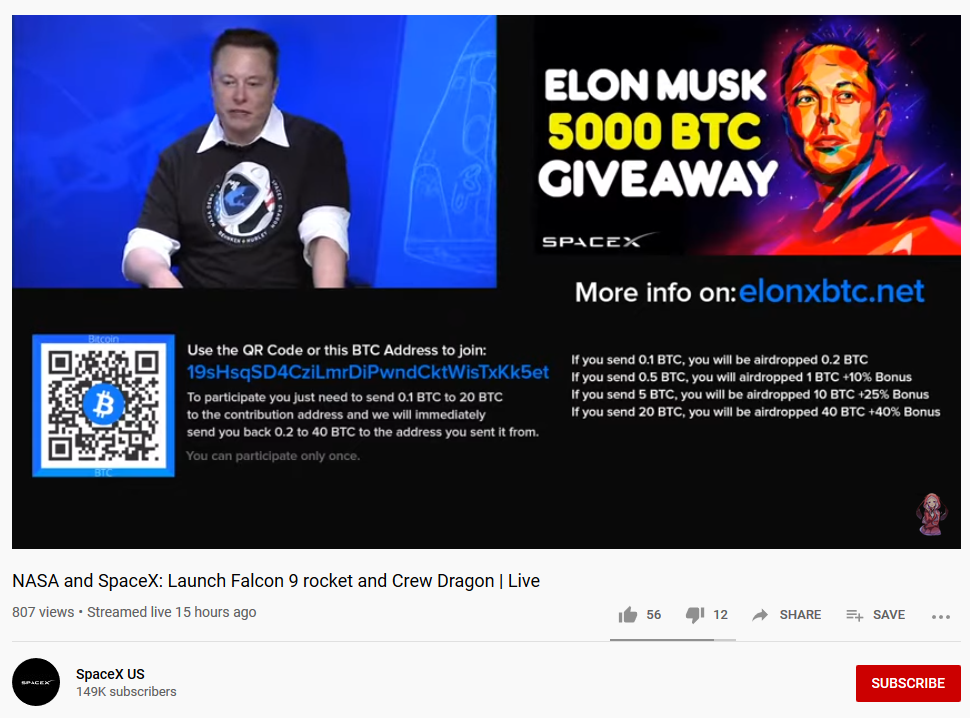Elon Musk Crypto Giveaway Scam refers to a generic scam that claims users who send any amount of cryptocurrency to the provided wallet address will receive double the amount back. It’s a very common scam that uses Elon Musk’s name to trick users. Users who send cryptocurrency will not only not receive anything in return, they will also be unable to get their cryptocurrencies back.
Cryptocurrency giveaway scams have become very common, particularly on social media platforms like X (previously known as Twitter). Scammers usually use the names of high-profile people to promote fake giveaways that invite people to send cryptocurrencies to supposedly get double the amount back. It goes without saying that the people whose names are used in these scams are in no way related to them. Scammers are merely using their popularity to promote their scams.
Cryptocurrency giveaway scams are usually more or less the same, even when operated by different malicious groups. They first claim that the giveaway is hosted by a celebrity who wants to “give back” and then explain that for a limited amount of time, any cryptocurrency transferred to the provided wallet addresses will be doubled and sent back. In reality, users would just be sending their cryptocurrencies to scammers. Once transferred, users won’t be able to reverse the transactions and get their crypto back.
In 2020, malicious actors were able to hack X (then known as Twitter) and hijack the accounts of several high-profile individuals as well as cryptocurrency companies. Hijacked accounts included those belonging to Bill Gates, Elon Musk, Barack Obama, Apple, CoinDesk, Kanye West, Coinbase, and Binance. All accounts posted messages saying they are giving back to the community and will double all amounts of Bitcoins sent. While the posts were up only for a couple of minutes, users transferred around $120,000 worth of Bitcoins to scammers’ accounts.
Upon entering the site, you will be greeted with this message:
Elon Musk Live Event
Official giveaway of BTC and ETH from Elon Musk
Elon Musk believes that cryptocurrency will make the world more fair. To speed up the process of cryptocurrency mass adoption, we’ve decided to run a Bitcoin & Ethereum giveaway
Cryptocurrency giveaways that promise to double any transferred amount will always be fake. Neither high-profile people like Elon Musk nor companies like Coinbase will ever host these kinds of giveaways. And if they were, they would be announced via official channels like official websites, certainly not posts on X from random accounts.
Crypto giveaway scams are often promoted on social media and YouTube
There are many ways you can encounter a crypto giveaway scam. You could be redirected to it by an adware infection or when browsing high-risk websites without an adblocker. You can often see them promoted in replies by fake accounts under Elon Musk’s posts on X. They are also common on YouTube, posted as videos by hijacked accounts.
One of the most common ways crypto giveaway scams like the Elon Musk Crypto Giveaway are promoted is via replies under social media posts. Scammers create profiles that imitate ones that belong to high-profile people like Elon Musk, and while the handle will be different, the name and profile picture will be the same. The accounts post replies under legitimate posts made by the accounts they’re imitating. This gives the impression that it’s actually the legitimate account posting a reply. The comments have the standard crypto giveaway scam texts. If users do not check the handle or the profile, they could easily be tricked.
Another common method of promotion is via YouTube videos. Malicious actors hijack unused or vulnerable YouTube accounts with at least several thousand subscribers. They then post videos promoting the fake giveaways. For example, a common video shows Elon Musk participating in a conference as well as an ad for the giveaway.
It’s also possible to be redirected to cryptocurrency giveaway scams if an adware program is installed on the computer. Adware is a rather minor infection that focuses on exposing users to as much sponsored content as possible. That can mean random ads popping up or redirects occurring out of nowhere. Adware usually installs via software bundling. It can be attached to free programs as an extra offer. The offers are optional but users need to manually deselect them to prevent them from installing. Because the offers are hidden, most users don’t deselect them, allowing the infections to install. Adware infections are very easily identifiable because of the increase in ads. Because they can be tricky to get rid of manually, using an anti-virus program is recommended.
You could also be redirected to the scam when browsing high-risk websites. Certain websites bombard users with ads when they click on anything. For example, sites that have pornography or pirated content are often guilty of triggering random redirects. Fortunately, these redirects can be easily prevented with a good adblocker program.
Site Disclaimer
2-remove-virus.com is not sponsored, owned, affiliated, or linked to malware developers or distributors that are referenced in this article. The article does not promote or endorse any type of malware. We aim at providing useful information that will help computer users to detect and eliminate the unwanted malicious programs from their computers. This can be done manually by following the instructions presented in the article or automatically by implementing the suggested anti-malware tools.
The article is only meant to be used for educational purposes. If you follow the instructions given in the article, you agree to be contracted by the disclaimer. We do not guarantee that the artcile will present you with a solution that removes the malign threats completely. Malware changes constantly, which is why, in some cases, it may be difficult to clean the computer fully by using only the manual removal instructions.

